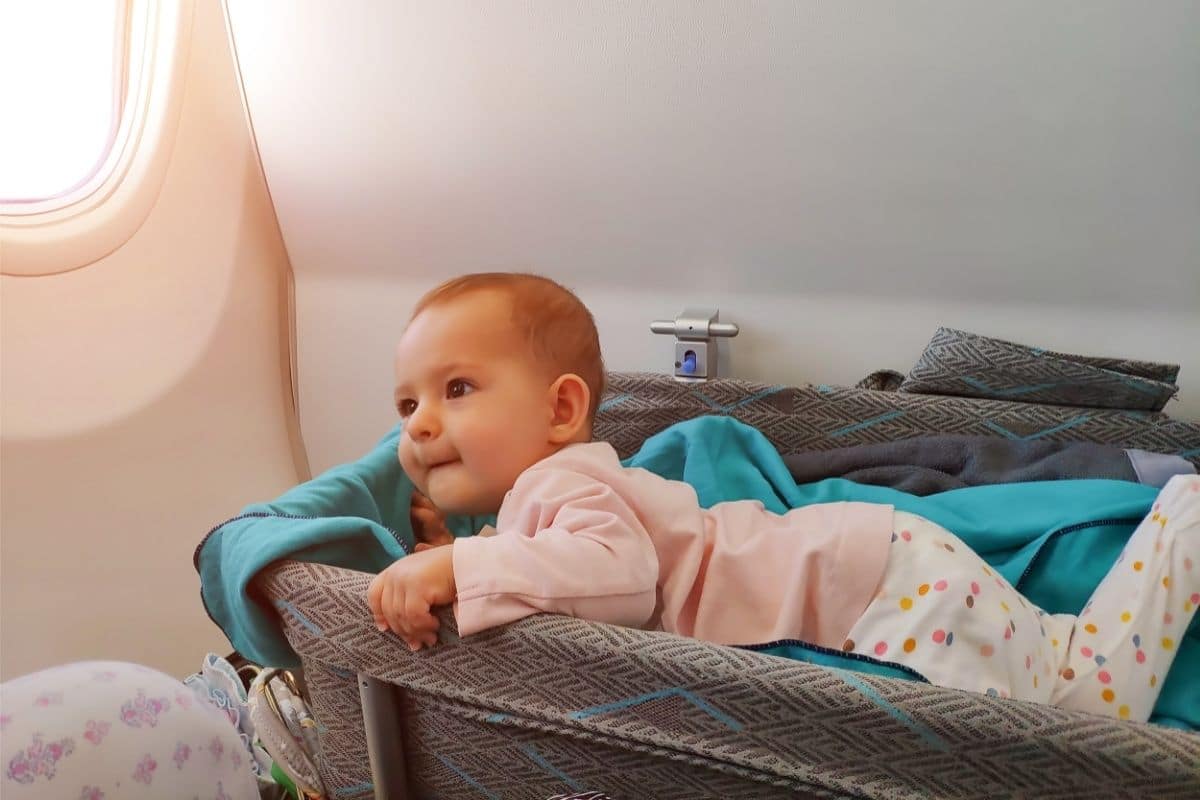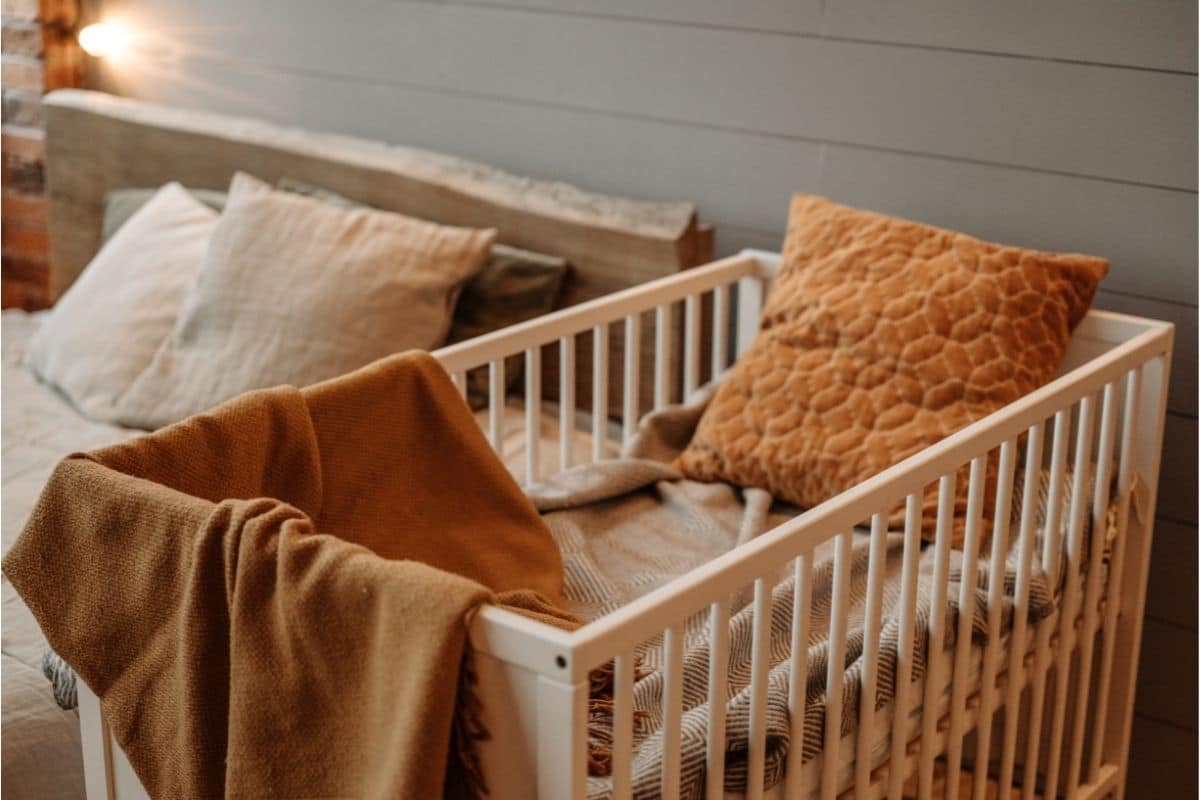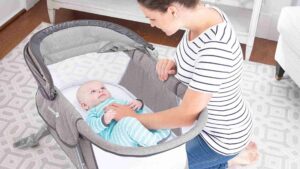When should babies stop sleeping in their bassinet? There are conflicting opinions about this topic.

Some parents believe that babies should stay in their bassinets until they are at least 2 years old, while others say that babies should only sleep in them for short periods of time.
The American Academy of Pediatrics recommends that infants under 6 months of age should sleep in cribs or bassinets. This recommendation comes from studies showing that babies who slept in bassinets had fewer SIDS (Sudden Infant Death Syndrome) deaths.
However, some experts argue that babies shouldn’t sleep in bassinets for too long because it might cause back problems later in life.
They also claim that babies who sleep in bassinets longer tend to wake up more often during the night.
In this article, we take a closer look at both sides of the discussion, ensuring that you have all the information you need to keep your baby safe, secure, and healthy.
What Is A Bassinet?
A bassinet is a portable bed designed specifically for babies. It’s usually made out of wood or metal with a mattress attached. The bed is placed next to the parent’s bed so that the baby can easily fall asleep when he/she wakes up during the night.
Why Should Babies Sleep In Their Cribs Or Bassinets?
Many people think that babies should sleep in their bassinet for as long as possible. Some of the main advantages of bassinets include:
They Help Prevent SIDS
According to some experts, placing babies in bassinets helps to offer some protection against SIDS or Sudden Infant Death Syndrome. Studies show that babies who sleep in their bassinet are less likely to die from SIDS than if they were left alone in their cribs.
The reasons for this are not fully understood but may be related to the fact that babies who sleep in a bassinet don’t roll over onto their stomachs as often.
Babies Who Sleep In Bassinets Are More Secure
Another reason why bassinets are useful is that they provide a safer environment for babies.
When babies are kept awake by crying, they become stressed and agitated, which makes them more vulnerable to illness. By keeping them calm, they’re able to rest better and get healthier faster.
They Allow You To Keep Your Baby Close
Unlike cribs, bassinets tend to be more portable, and so can be placed next to your bed with relative ease. This means that you can keep your baby closer to you, which can offer significant benefits for both baby and mother.
Some Experts Say That Bassinets Aren’t Necessary At All
While many doctors agree that bassinets are beneficial for babies, some disagree. For example, Dr. William Sears says that bassinets aren’t necessary at all.
He claims that babies can safely sleep in their cribs without any danger.
According to Dr. Sears, the benefits of bassinets come mainly from the fact that they make parents feel good about being able to watch over their babies while they sleep.
While some experts say that bassinets aren’t dangerous, others warn that they can lead to back problems later on.
This is especially true if the baby sleeps in his bassinet for too long. One study found that babies who slept in their bassinet past age one had an increased chance of developing scoliosis. Scoliosis is a condition where the spine curves abnormally.
When Should I Transition My Baby To A Crib?
The best way to decide whether or not your baby needs a bassinet is to observe them. If they seems comfortable sleeping in the bassinet, then you can continue using it.
Most babies transition from a bassinet to a crib at between 3 to 6 months of age. Ultimately, the decision will depend largely on your baby, and each infant will be different.

It is important to note, however, that waiting for longer can mean that your baby is more resistant to the move, and this can make it trickier to go from bassinet to crib.
The transition will depend on your child, but some key points to consider include:
Your Baby’s Development
Your baby’s development plays a big role in determining when to start transitioning them to a crib. As mentioned earlier, most babies transition to the crib around three to six months old.
During this period, your baby’s weight increases rapidly, so she becomes heavier and heavier. They also start crawling, standing up, and walking. These milestones help to develop motor skills and coordination.
Their Sleeping Position
Another factor that determines when to transition your baby to a crib is them sleeping position. Most babies prefer to sleep on their backs.
They also tend to wake up during the night when they have trouble falling asleep. If your baby seems uncomfortable in their bassinet and constantly wakes through the night, it may be time to consider a crib.
Your Comfort Level
Your own comfort level is another important factor to consider. Some parents find it hard to leave their baby alone in a room full of unfamiliar objects. Others would rather keep their baby close to them than place them in a room away from them.
In some cases, depending on space, your own comfort can have the biggest impact on when you move your child to a crib – particularly if this is in a different room to you.
The Cost Factor
The cost is another factor to consider. Many parents choose to buy a bassinet because they believe it is safer for their children.
However, there are other factors to take into consideration such as comfort, convenience, and safety.
Breastfeeding
If you plan on breastfeeding your baby, you may want to delay transitioning them to a crib until after she completes them first year.
It is recommended that babies breastfeed exclusively for at least six months. This helps to build strong bones and muscles.
Ultimately, the choice to move from bassinet to crib is a personal one and will depend largely on the needs and development of your infant.
As a rule, most experts recommend that newborn babies are moved to a crib by six months old – once again, this will look different for everyone.
Why Won’t My Baby Sleep In The Bassinet?
Babies love to explore new things. They like to touch everything. If you’re not careful, you might end up with an overstimulated baby who doesn’t want to nap. This is why it’s best to introduce your baby to the world gradually.
Here are some reasons why your baby is struggling to get to sleep:
Your Baby Is Teething
Teething is one of the most common reasons why babies cry when they wake up during the night.
When your baby is teething, he’ll experience pain when chewing on his gums. This causes them to wake up frequently throughout the night.
Your Baby Is Sick
Your baby may be feeling unwell and could be experiencing cold symptoms such as fever, sneezing, coughing, runny nose, and congestion. These conditions can cause your baby to wake up frequently throughout his naps.
Ear infections can be another common cause of illness in babies and are usually caused when bacteria enter through the ears.
This causes pain and discomfort, impacting sleep. If your baby suffers from frequent ear infections, then you should consult your doctor.
Your Baby Is Bored
It may sound surprising, but boredom is another common reason why babies refuse to nap. Babies love to explore their surroundings, and do need stimulation to keep them happy and healthy.
However, if they’re kept inside all day, with little stimulation, they may become restless and fussy – this can have a negative impact on their sleep patterns.
Your Baby Is Tired
Once again, this may sound strange, but if your baby is tired, he’ll probably refuse to nap. Just like adults, babies can become overtired quickly, and this can make it harder for them to drift off, resulting in agitation and broken sleep.
To help this, we would recommend gently rocking, talking to, and soothing your baby – distracting them with tummy time or low chatter can help them to drift off more easily.
In some cases, you can also benefit from restarting the bedtime routine all over again – this can help to “reset” your baby, breaking the cycle of tiredness, and getting them ready for sleep.
Your Baby Is Hungry Or Thirsty
Feeding your baby right before bedtime will ensure that he gets enough calories to stay awake. However, if you feed your baby shortly before bedtime, he may have trouble falling asleep.
Your Baby Is Scared
Some babies prefer sleeping alone. Others find comfort by being near their parents. If this is the case with your baby, then you should consider placing them in a bassinet next to your bed.
Some babies also don’t like loud noises and can become afraid, inhibiting their ability to drift off. If your baby is afraid of loud noises, then you should place them in a quiet room where she can hear nothing but the sound of your breathing.
Your Baby Is Uncomfortable
In some cases, your baby may be uncomfortable in their bassinet. Always use firm surfaces for safety, and make sure that your baby is not too warm or too cold.
Most babies prefer to sleep in a temperature range between 68°F and 72°F (20°C and 22°C). If your baby is too warm or too cold, then he’ll most likely wake up frequently throughout the day.
Your Baby Needs A Diaper Change
Diaper changes are one of the reasons why babies wake up frequently throughout the evening – checking this first can save you a lot of time!
Your Baby Does Not Want To Sleep
Just like adults, your baby may just not be in the mood to sleep right now. Forcing the issue can make things worse, so try picking your baby up and rocking or chatting to them until they are ready to settle down.
How Can I Get My Baby To Sleep?
You can use many methods to get your baby to fall asleep. Here are some tips:

Play Music
Music has been proven to help babies fall asleep faster. There are many apps available that allow you to play soothing sounds through headphones.
Just make sure that the volume isn’t too loud, since it could disturb your baby. White noise can also be very soothing and can help your little one to drift off more quickly.
Use Swaddling Blankets
Swaddling blankets are soft and warm. They provide a safe environment for your baby to rest comfortably. A blanket wrapped tightly around your baby provides warmth and security.
Put Your Baby Down Gently
When putting your baby down, don’t just drop them onto his back. Instead, lay them down gently on his side. This way he can feel secure and comfortable while resting.
Hold Your Baby
Holding your baby is comforting for both of you. While holding your baby, stroke his hair, kiss his forehead, and sing softly to them. All these actions will help calm your baby down and induce sleep.
Final Thoughts
A bassinet offers plenty of advantages for your newborn, and can really help them to get settled and established during those all-important first weeks and months of life.
It’s also great for keeping your baby close at night, helping to prevent SIDS, and ensuring that your baby has plenty of opportunities to bond with you.
Once your baby is ready – usually at around six months – you will be ready to move onto a crib and can help to develop good sleep patterns that will last for a lifetime.

Carly Link, a 33-year old mother of two toddlers. She is a parent and goes through a lot of the usual parenting difficulties herself. Carly shares all her experiences and knowledge about the best baby products through this blog.








